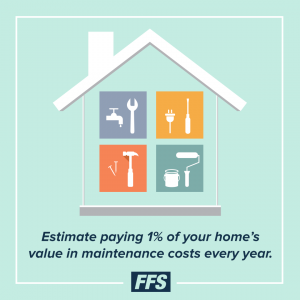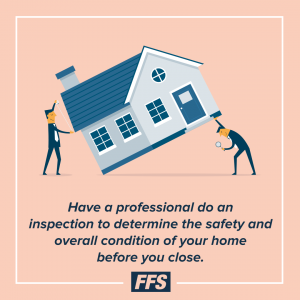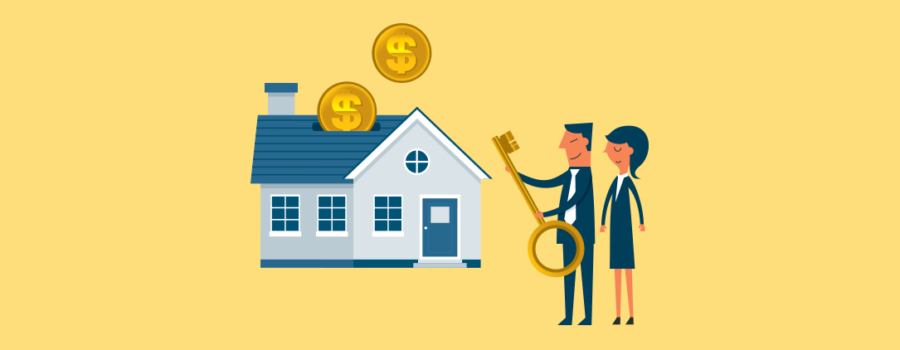Buying a house can be daunting, but it can also be exciting if you come in prepared and understand the hidden costs of home buying. This is no decision to take too lightly, and you will want to do months of planning and research beforehand. Beginners may think buying a house stops at budgeting for the down payment and ongoing mortgage, but there are many other factors to consider before you put down any money on a new home.
First, you want to be as financially healthy as possible before you consider buying a house. Keep track of your spending to know how much you can afford for a mortgage. You also should have an emergency savings that contains at least six months of living expenses in addition to the money saved for the down payment and closing costs covered below.
After you meet these requirements, here are the fees you might pay when purchasing a home:
What You Will Pay in the Long Run
Your largest monthly expense will likely be your mortgage. The amount you receive from a lender will be based on your monthly income, your credit score, how much debt you carry, and how long you have been with your current job. You will have to get preapproved for a loan before you place an offer on any home; compare mortgages lenders to find the one that offers the best interest rate and lowest fees.
Alongside your mortgage, your monthly expenses will include:
Your tax rate is calculated by the local government and based on the value of your property and land. Rates vary by type of property and jurisdiction, so it is important to understand the tax laws in any neighborhood you consider. Rates increase over time —sometimes significantly in a single year — so look into trends over the last few years and news of any forthcoming rate increases.
This form of property insurance will cover any loss or damage to your house, furnishings and other home assets. Compare different policies to find what works best for your needs.
-
H.O.A. Fees
Homeowners association fees may be applicable if you plan to buy a condo, townhome, or a home in a development. H.O.A. fees can cover a variety of expenses, from a community pool to exterior maintenance and repairs. Read any H.O.A. documentation carefully and ask questions about the regular maintenance on the property and any forthcoming renovations or improvements that would increase your costs in the next few years.
-
Maintenance Costs
Owning a home means that when something breaks, you can no longer call a landlord and have them take care of it for you. Maintenance costs are now on your shoulders, including the time, sweat and energy it will cost you to make certain repairs. It is recommended you set aside at least 1% of the cost of your home each year for maintenance costs. Consider this before paying less for a “fixer-upper” so you are sure you will be up to the challenge.
 Inspecting for Maintenance Costs
Inspecting for Maintenance Costs
After you have made an offer but before you close on your home, have a professional do a home inspection for the overall safety and condition of the place. Depending on your home, you may want to hire a structural engineer and a surveyor in additional to a home inspector. These experts can evaluate the integrity of your home’s foundation and your property lines, which may be different from what the homeowner has presented. Do as much research on the front end to ensure you are not saddled with any costly repairs or replacements you didn’t anticipate. Take into account the expected lifetime of the following structural components and appliances:
- Roof: 20–30 years.
- Carpet: 8–10 years.
- Linoleum: 25 years.
- Vinyl: 50 years.
- Marble, slate, or granite: 100 years.
- Wooden Decks / Porches: 20 years.
- Central Heating / A.C.: 17 years.
- Stove: 20 years.
- Refrigerator: 11 years.
- Washer / Dryer: 9–12 years.Dish Washer: 9 years.
In addition to your down payment, you will have to pay the following closing costs (usually amounting to anywhere from 2–6% of the purchase price). These costs can be negotiated and paid by the seller, buyer or both.
-
Title Search
This is a fee charged to analyze the history of the property and deed, ensuring the property’s legal ownership and uncovering any disputes, claims or liens that might exist on such. The title must be clean to properly purchase the house.
-
Appraisals
An appraiser will come in and investigate the true value of the property. This helps determine how much a lender will give you as a loan and what terms it may require.
-
Lender Origination Fees
Fees that cover any administrative costs on behalf of the lender, typically 1% of the amount of your loan.
-
Mortgage Insurance
Your lender may require mortgage insurance if your down payment is less than 20% of the purchase price. In this case, they may also require you pay the first month of this insurance at closing.
 Take Your Time and Be Prepared
Take Your Time and Be Prepared
Buying a home requires a lot of information, more than anyone should expect to take in all at once. Remember that big purchases also bring out big emotions, so give yourself time to process any stress, anxiety or excitement you may be feeling during your house hunting. The more prepared you are before you start the home-buying process, the better off you will be and the greater the chance you will save thousands of dollars in the long run.
Check out our other Focus on YOUR Money post in this series about the hidden costs of car buying here.
FFS Agents – share this post with your networks using our resources in the ABO.




